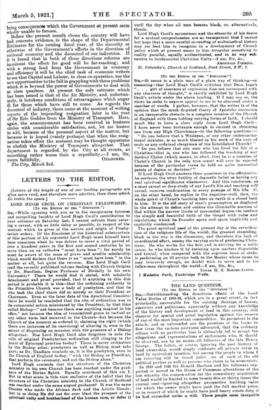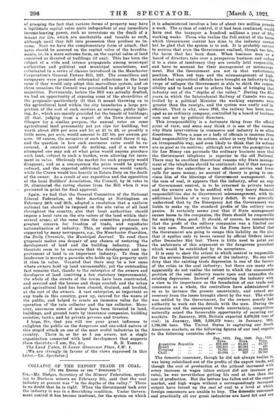THE LAND QUESTION.
[To THE EDITOR OF THE " SPECTATOR."] Sia,—Notwithstanding the disastrous effects of the Land Value Duties of 1909-10, which are to a great extent, in fact principally, answerable for the existing shortage of housed, amateurs and politicians, apparently without any knowledge of the history and development of land in this country, still clamour for special and penal legislation against the owners of one of the most important commodities. So persistent is the attack, and so unbounded are the promises of the boons to flow from the various nostrums advocated, that the ordinary citizen with no particular bias is ultimately led to accept the allegations and representations of enthusiasts who, it should be observed, are by no means all followers of the late Henry George. The latter, of course, ignoring the past history of land ownership, would simply confiscate all private value in land by equivalent taxation, but among the people to whom I am referring will be found politi• ans of each of the old political parties as well as persons who claim to be economists. In 1919 and 1920 Sir Donald Maclean and his followers sup- ported or moved in the House of Commons alterations of tho law whereby the compensation for the compulsory acquisition of land would be limited to some twenty-five or thirty times the annual rent—ignoring altogether prospective building value for which the owner might have paid the full market price, or in respect of which he might have paid heavy estate duty if -he had succeeded nadir a will. Thee. people seem incapable of grasping the fact that various forms of property may have a legitimate capital value quite independent of any immediate income-bearing power, such as reversions on the death of a tenant for life, which are marketable and taxable as such, although until they fall into possession they produce no in- come. Next we have the complementary form of attack, that rates should be assessed on the capital value of the heredita- ments, or, in a more extreme form, on the capital value of land conceived as divested of buildings (if any). This has been the subject of a wide and intense propaganda among municipal authorities and political and municipal associations, and culminated in a series of clauses introduced in the Manchester Corporation's General Powers Bill, 1921. The councillors and ratepayers were promised substantial reductions in the local rates if they would only adopt this marvellous system, and on three occasions the Council was persuaded to adopt it by large majorities. Fortunately, before the Bill was actually drafted, we had an opportunity of exposing some of the absurdities of the proposals—particularly (1) that it meant throwing on to the agricultural land within the city boundaries a large pro- portion of the cost of, such services as sewerage, public light- ing, &c., which are mainly provided for the benefit of buildings; (2) that, judging from a report of the Town Assessor of Glasgow for a similar purpose, the annual rates on some agricultural land presumably not yet ripe for building, but worth about £370 per acre and let at £1 to £3, or possibly a little more, per acre, would amount to £27 158. per annum per acre. Of course, the occupiers of such land would throw it up, and the question is how such enormous rates could be re- covered. A receiver could do nothing, and if a sale were attempted one may ask at what price would anyone purchase such land, subject to such a burden, even allowing for incre- ment in value. Obviously the market for such property would disappear, and as a consequence the price would be greatly reduced, and the expected additional revenue would vanish, while the Crown would lose heavily in Estate Duty on the death of the owner. As a result of our exposition and the opposition of the local Builders' Association, the Council, by 56 votes to 50, eliminated the rating clauses from the Bill when it was presented in print for final approval.
Again, we find that the General Committee of the National Liberal Federation, at their meeting at Nottingham on February 24th and 25th, adopted a resolution that a uniform national tax should be imposed on the site value of all land throughout the country, also that local authorities should impose a local rate on the site values of the land within their several areas; at the same time the committee professes the greatest concern for freedom of trade, and repudiates nationalization of industry. This, or similar proposals, are supported by many newspapers, e.g., the Manchester Guardian, the Daily Chronicle, the Municipal Journal. To read these proposals makes one despair of any chance of restoring the development of land and the building industry. These theorists seem to be unaware that the development and im- provement of land is an important industry. To them the landowner is merely a parasite who holds up his property until it rises in value. Granted that there may be a few cases where owners hold up land unreasonably, yet the outstanding fact remains that, thanks to the enterprise of the owners and developers of land (omitting a few statutory improvements), the whole of the streets of the towns have been constructed, and sewered and the houses and shops erected, and the urban and agricultural land has been cleared, drained, and levelled, at the cost of the owners. A vast enterprise, as important as any trade in this country, grew up, catered for the wants of the public, and helped to create an immense value for the operation of 'the rate collector and the tax collector. More- over, enormous sums of money have been invested in land, buildings, and ground rents by insurance companies, building societies, banks, and by private persons and trustees.
I hope, Sir, that you will use your great influence to enlighten the public on the dangerous and one-sided nature of this stupid attack on one of the most useful industries in the country. There is, so far as I am aware, not a single organization connected with land development that supports these theorists.—I am, Sir, &c., R. B. YARDLEY.
The Land Union, 15 Lower Grosvenor Place, S.W. 1.
[We are strongly in favour of the views expressed in this latter.—ED. Spectator.]



































 Previous page
Previous page